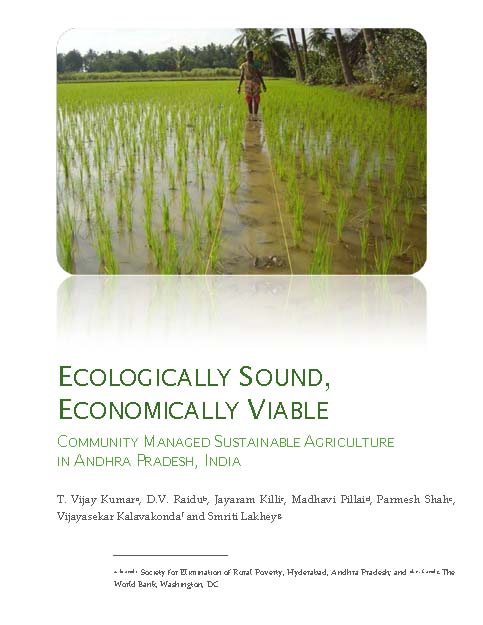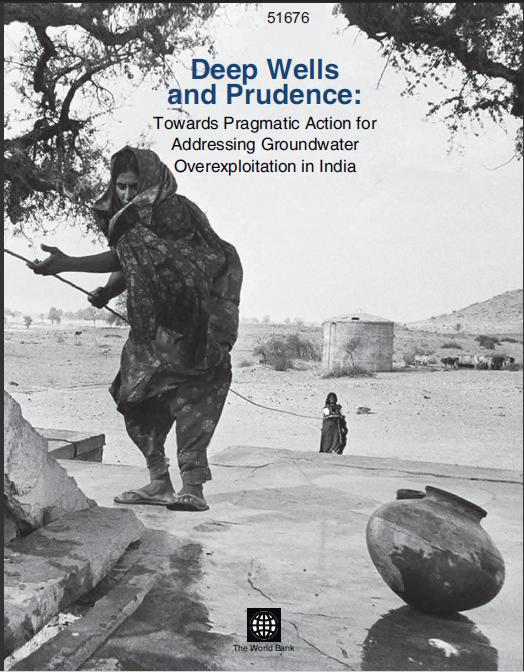World Bank
Importance of water for shared prosperity
Posted on 25 May, 2024 04:36 PMAccess to safe drinking water and sanitation, reliable water-supply for agriculture and industry, and protection against droughts and floods are essential for human and economic development, says a World Bank report “Water for shared prosperity” released recently at the 10th World Water For

The miserable plight of sanitation workers
Posted on 29 Feb, 2020 06:01 PMMany of the challenges sanitation workers face, stem from their lack of visibility in society, says a report ‘Health, Safety and Dignity of Sanitation Workers’ produced jointly by The World Bank,

Can we reverse the outcomes of climate change for India?
Posted on 16 Dec, 2014 02:13 PMThe report title 'Turn down the heat: Climate extremes, regional impacts and the case for resilience' published by the World Bank, highlights the risks posed by climate

India: Improving urban water supply and sanitation service provision- Lessons from business plans for Maharashtra, Rajasthan, Haryana and international good practices- Report by the World Bank
Posted on 19 Aug, 2012 04:50 PMThis report by the World Bank identifies the key elements of a State-wide program for improving water supply and sanitation services and accountability on the basis of
Biomass for sustainable development - Lessons for decentralized energy delivery in India – A report by World Bank
Posted on 22 Aug, 2011 07:55 PM It presents a summary of recommendations for enhancing the effectiveness of energy service delivery through a decentralized program, which currently finds a critical place in the Government‘s energy policies and electrification targets.
It presents a summary of recommendations for enhancing the effectiveness of energy service delivery through a decentralized program, which currently finds a critical place in the Government‘s energy policies and electrification targets.
The pilot phase of the Village Energy Security Programme has shown several lessons and the need for improvements.
Ecologically sound, economically viable community managed sustainable agriculture in Andhra Pradesh – A report by Society for Elimination of Rural Poverty and World Bank
Posted on 15 May, 2011 09:56 PM This report by Society for Elimination of Rural Poverty and World Bank deals with Community Managed Sustainable Agriculture (CMSA) in Andhra Pradesh. The paper also analyses the initial results of economic and environmental impact of CMSA, distills the key lessons learned from the Andhra Pradesh experience, and draws possible implications for future.
This report by Society for Elimination of Rural Poverty and World Bank deals with Community Managed Sustainable Agriculture (CMSA) in Andhra Pradesh. The paper also analyses the initial results of economic and environmental impact of CMSA, distills the key lessons learned from the Andhra Pradesh experience, and draws possible implications for future.
To address the adverse impacts of green revolution, the alternative approach to manage agriculture i.e., CMSA is being tested and practiced in the State. The CMSA approach replaces the use of chemical pesticides with a combination of physical and biological measures—including eco-friendly bio-pesticides—and complements it by adopting biological and agronomic soil fertility improvement measures leading to reduced use of chemical fertilizers.
Distributional implications of climate change in India – A policy research working paper by World Bank
Posted on 14 Apr, 2011 03:49 PMThis working paper by World Bank analyzes how changes in the prices of land, labor, and food induced by modest temperature increases over the next three decades will affect household-level welfare in India.
Deep wells and prudence - Towards pragmatic action for addressing groundwater overexploitation in India - A World Bank document (2010)
Posted on 12 Apr, 2011 01:51 AM India is the largest user of groundwater resources in the world. It is estimated that approximately 230 cubic kilometers per year is used annually, this is more than a quarter of the total world consumption from this resource.
India is the largest user of groundwater resources in the world. It is estimated that approximately 230 cubic kilometers per year is used annually, this is more than a quarter of the total world consumption from this resource.
It is in this context that this World Bank report looks at the reasons for this quantum of groundwater usage.
The report delves into socio-economic and political reasons and looks at policies which inadvertently promote so much extraction. The report also analyses various attempts to manage this resource. These attempts range from government and international agency efforts directed to grassroots mobilisations. Finally the report comes out with suggestions to deal with this crisis.
Financing on-site sanitation for the poor: A six country comparative review and analysis - A report by WSP (World Bank)
Posted on 20 Apr, 2010 06:58 PMThis report by the Water and Sanitation Programme (WSP) draws attention to the fact that a very high percentage (40%) of the population in the world does not have access to basic level of sanitation, which has serious health consequences and puts a considerable economic burden on the poor. The report explores the issue of what can be the most appropriate financing mechanisms to meet the sanitation needs of the poor.
Climate change impacts in drought and flood-affected Areas: Case studies in India - A report by the World Bank
Posted on 11 Apr, 2010 03:50 PMThis report by the World Bank discusses the climate changes in India and the disasters associated with these climate changes such as floods and droughts and their negative impact on agriculture, food production, livelihoods, security and the condition of the vulnerable groups in the country. The report goes on to discuss the policies undertaken by the Government of India to deal and adapt with these changes and the challenges faced in implementing these policies.